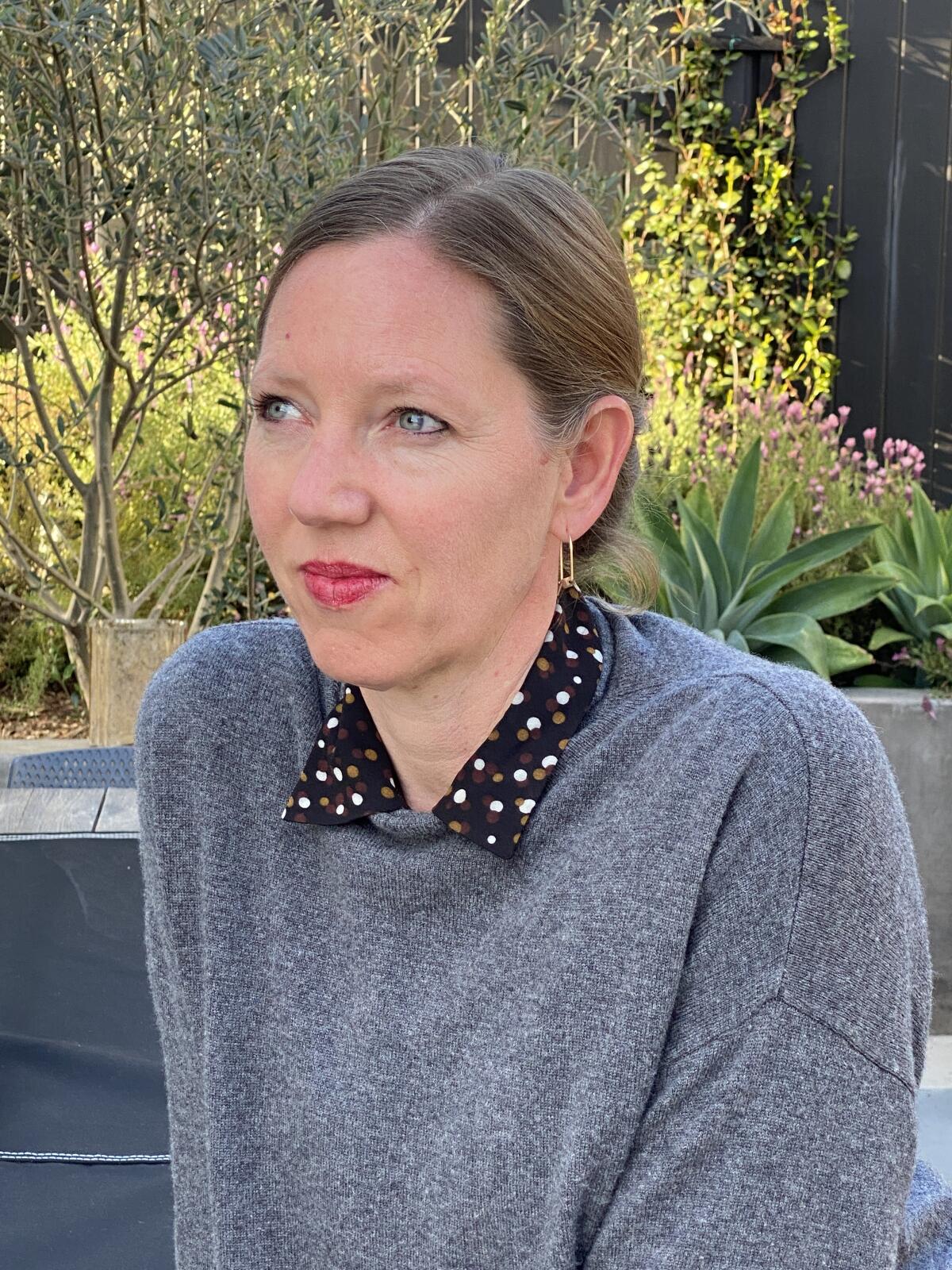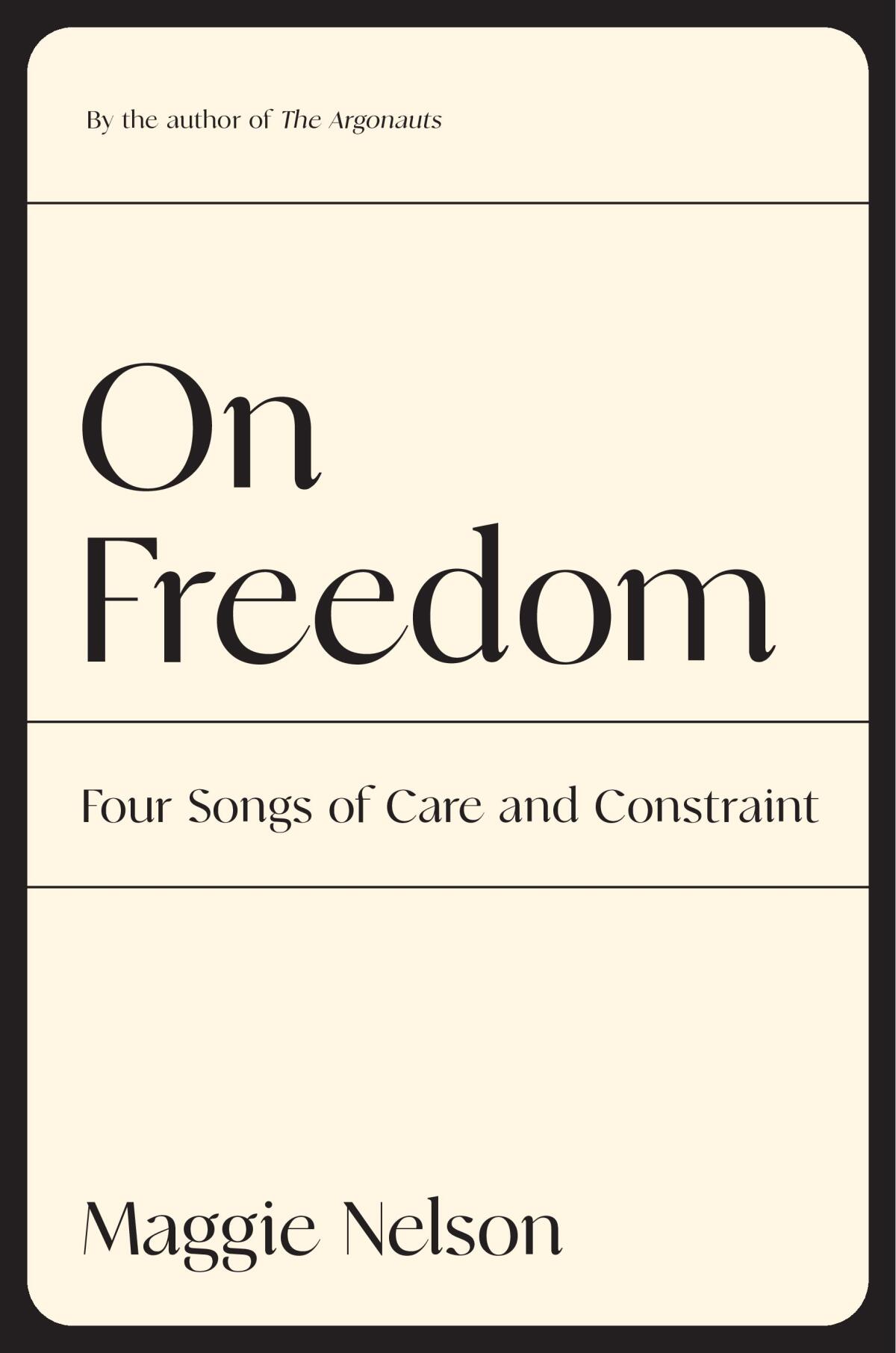Visiting L.A.’s oracle of ‘Freedom,’ the all-seeing essayist Maggie Nelson

On the Shelf
On Freedom: Four Songs of Care and Constraint
By Maggie Nelson
Graywolf: 288 pages, $27
If you buy books linked on our site, The Times may earn a commission from Bookshop.org, whose fees support independent bookstores.
“Well, this is bizarre, isn’t it?” Maggie Nelson said as she emerged from the back door of a house in Oakland. “Meeting you, outside, in these circumstances,” she laughed. “Welcome to this house that isn’t mine!”
She had no idea how bizarre it was. From her beautiful 2009 prose-poem “Bluets” to “The Argonauts,” a dazzling 2015 memoir using her romance with trans artist Harry Dodge to offer an “auto-theory” of gender and desire, Nelson has become a legendary figure among a certain subset of readers: a generation grappling with the art and identity in a post-9/11 world, striving under a capitalist system that has largely failed them. A fan base encapsulated in this Tweet: “Being a depressed millennial who went to an elite college means I can spot a copy of Maggie Nelson’s Bluets from a mile away.”
Walking into the backyard of the house that wasn’t hers (Nelson lives in Los Angeles and teaches at USC) was akin to making a pilgrimage to an oracle, a childlike empress of letters. We were meeting to talk about her new book, “On Freedom,” her 10th, and her first in six years. Nelson popped inside to put her dog away. She made me a cup of tea. It was almost too much. “I’m going to try to not cry, or fangirl-out on you too much,” I warned her. She laughed. “Thank you,” she said, “that’s very nice.”
“Bluets” had sent me on a frenzied journey through her earlier work: “Jane: A Murder” and “The Red Parts,” books about Nelson’s aunt, who was murdered before she was born, as well as a few books of poetry. But “On Freedom‘s” progenitor is 2011’s “The Art of Cruelty.” “I had wanted to write this book at least since the subject [of freedom] emerged as an unexpected subtext” in that book, Nelson explains. Subtitled “Four Songs of Care and Constraint,” it is a discussion of freedom divided into four realms: art, sex, drugs and climate.
Concepts like art, cruelty and freedom are a lot to wrap one’s head around. Yet Nelson bounds across knotty subjects like #MeToo, sex positivity, addiction, queer theory, anxiety and carceral feminism without tiring of the painstaking work of untangling controversies. Seeking purchase among them, I flailed around for answers as Nelson nodded and murmured “mm-hmm,” like a teacher waiting for the student to arrive at their own understanding.
Eula Biss’ last collection, “On Immunity,” exposed our society’s fragile health. “Having and Being Had” takes on capitalism (and defends Joan Didion).
Questions about freedom feel urgent, even life-or-death. During the pandemic, the concept has been distorted: antivaxxers’ “freedom” to forgo the personal and social benefit of inoculation, their “freedom” to spread contagion by not wearing a mask. Trumpism’s “freedom” of “expression” to rush the Capitol, deny climate change, grab women wherever they like. But that’s only one kind of freedom, and after reading Nelson, your understanding of the word, and of humanity itself, will expand in surprising directions.
We began with #MeToo and her mention of Monica Lewinsky, who publicly wrestled with the movement. “Sure, my boss took advantage of me, but I will always remain firm on this point: it was a consensual relationship,” she wrote in Vanity Fair in 2014. Four years later she took to the same magazine to align herself with #MeToo — to a point. “‘This’ (sigh) is as far as I’ve gotten in my reevaluation,” she concluded. The “(sigh)” in Lewinsky’s account is what matters for Nelson. “Lewinsky here demonstrates how such resistance can coexist with gratitude for feminist solidarity, insight, and protest, because it can,” Nelson writes.
Her position struck me, I told her, as complicating the simplistic narrative of a (usually male) aggressor and a (usually female) victim.
“Oh,” Nelson said, blushing. “I don’t mean to make a judgment of #MeToo.”

Her section on the AIDS epidemic is another attempt to rescue familiar concepts from the banality of slogans, of binaries. She quotes art historian Douglas Crimp, in a letter explaining why gay men might choose to have unprotected sex at the height of AIDS: “I have a simple answer. We are human.”
“In that chapter,” Nelson explained, “I was really trying to excavate the non-tinny version of sex positivity and re-tether it to queer history.” She writes, “Visitors to my high school in San Francisco in the 1980s didn’t come to our assemblies to talk about consent; they came covered in Kaposi sarcoma to tell us the facts known and unknown about HIV.”
When I asked whether there was an explicit connection between a policing of sexual desire in #MeToo and the experience of gay men in the AIDS era, Nelson adamantly demurred. “Queers know better than anybody about people ‘doing sex wrong,’” she said. “But I certainly can’t speak to a gay male experience.”
“My Dark Vanessa” is the latest and most unsettlingly effective book in a timely genre.
And when I asked about “these people” — the COVID and climate-change deniers in her section on climate, what were they seeking freedom from? Anxiety? — she looked up, eyebrows raised.
“I’d put it slightly more generously that a denial of vulnerability is still a psychic response — it’s one possible response — to deny that it’s happening or say that it’s God’s will,” she said. “Vulnerability is hard for everyone to bear, and I think people are frightened.”
There was a pause while I stopped to consider Nelson’s empathy for those who have been putting the rest of us at risk.
“The Barnard Center for Research on Women has this great series of videos called ‘No One Is Disposable’ — you should watch them,” she said. “I really believe that: that no one is disposable. That is the centerpiece of abolitionist feminism and abolitionist thinking.”
It struck me like a gong. “On Freedom” isn’t a book about morality but about abolition in the abstract sense: defunding the cop in your mind. Nelson wants her reader to move past seeing individuals, or even humanity itself, as “good” or “bad.” “On Freedom” asks us, in the face of anxiety and uncertainty and in defiance of a mass culture of blame-seeking, to move past our lust for punishment into a place of acceptance.
Nelson calls L.A., where she has lived since 2005, “a fun place to hide out. It’s fun to be more immersed in forms of art that aren’t about writing. And being married to an artist is like being a spy in the house of love. But I lived in New York from 17 until I was 33. It will always be home.”
This is among the reasons she closes “On Freedom” by thinking back to her time in New York — specifically to the day she finished her oral exams for graduate school, just a few weeks after 9/11. One exam topic was a quotation from Ralph Waldo Emerson: “This time, like all times, is a very good one, if we but know what to do with it.” Sitting in the exam room, and sitting now with all the horror and chaos of the past three years, Nelson wondered, “How is this time a very good one?” and “What would it mean to ‘know what to do with it’?”
It was a question I labored over as I left our interview — feeling a bit rattled, and questioning my own tolerance of nuance and indeterminacy. In a section on Buddhism, Nelson refers to a remark the teacher Pema Chödrön made about her own teachers: “‘The environment was safe, but the teachings were threatening.’” One could say the same about Nelson. I looked back up to the deck where we’d been sitting, but the oracle had slipped away.
Annette Gordon-Reed, Ayad Akhtar, Héctor Tobar, Martha Minow, David Kaye and Jonathan Rauch discuss the Jan. 6 riot and what we do about it.
Ferri’s most recent book is “Silent Cities: New York.”
More to Read
Sign up for our Book Club newsletter
Get the latest news, events and more from the Los Angeles Times Book Club, and help us get L.A. reading and talking.
You may occasionally receive promotional content from the Los Angeles Times.







